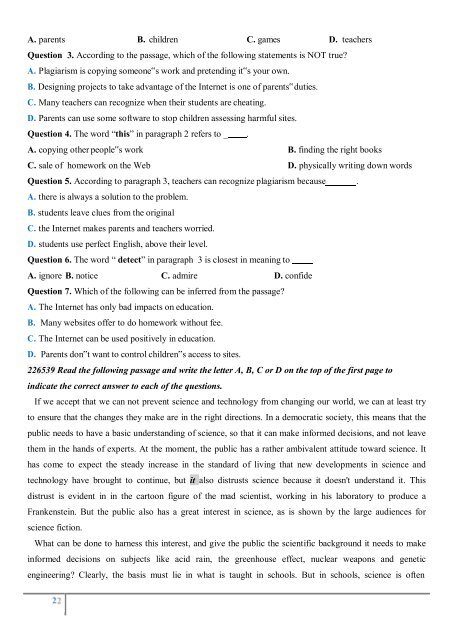12 đề thi thử THPT Quốc gia môn tiếng Anh năm 2018 có lời giải chi tiết
https://app.box.com/s/nnfa5e7e8wjt4ogw5c12nscparzxshyv
https://app.box.com/s/nnfa5e7e8wjt4ogw5c12nscparzxshyv
You also want an ePaper? Increase the reach of your titles
YUMPU automatically turns print PDFs into web optimized ePapers that Google loves.
A. parents B. <strong>chi</strong>ldren C. games D. teachers<br />
Question 3. According to the passage, which of the following statements is NOT true?<br />
A. Pla<strong>gia</strong>rism is copying someone‟s work and pretending it‟s your own.<br />
B. Designing projects to take advantage of the Internet is one of parents‟ duties.<br />
C. Many teachers can recognize when their students are cheating.<br />
D. Parents can use some software to stop <strong>chi</strong>ldren assessing harmful sites.<br />
Question 4. The word “<strong>thi</strong>s” in paragraph 2 refers to _ .<br />
A. copying other people‟s work B. finding the right books<br />
C. sale of homework on the Web D. physically writing down words<br />
Question 5. According to paragraph 3, teachers can recognize pla<strong>gia</strong>rism because .<br />
A. there is always a solution to the problem.<br />
B. students leave clues from the original<br />
C. the Internet makes parents and teachers worried.<br />
D. students use perfect English, above their level.<br />
Question 6. The word “ detect” in paragraph 3 is closest in meaning to<br />
A. ignore B. notice C. admire D. confide<br />
Question 7. Which of the following can be inferred from the passage?<br />
A. The Internet has only bad impacts on education.<br />
B. Many websites offer to do homework without fee.<br />
C. The Internet can be used positively in education.<br />
D. Parents don‟t want to control <strong>chi</strong>ldren‟s access to sites.<br />
226539 Read the following passage and write the letter A, B, C or D on the top of the first page to<br />
indicate the correct answer to each of the questions.<br />
If we accept that we can not prevent science and technology from changing our world, we can at least try<br />
to ensure that the changes they make are in the right directions. In a democratic society, <strong>thi</strong>s means that the<br />
public needs to have a basic understanding of science, so that it can make informed decisions, and not leave<br />
them in the hands of experts. At the moment, the public has a rather ambivalent attitude toward science. It<br />
has come to expect the steady increase in the standard of living that new developments in science and<br />
technology have brought to continue, but it also distrusts science because it doesn't understand it. This<br />
distrust is evident in in the cartoon figure of the mad scientist, working in his laboratory to produce a<br />
Frankenstein. But the public also has a great interest in science, as is shown by the large audiences for<br />
science fiction.<br />
What can be done to harness <strong>thi</strong>s interest, and give the public the scientific background it needs to make<br />
informed decisions on subjects like acid rain, the greenhouse effect, nuclear weapons and genetic<br />
engineering? Clearly, the basis must lie in what is taught in schools. But in schools, science is often<br />
2

















